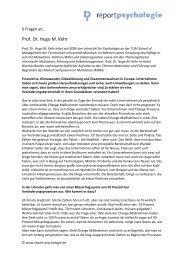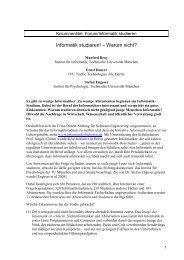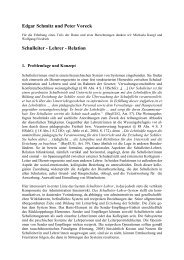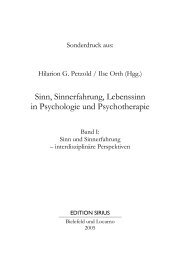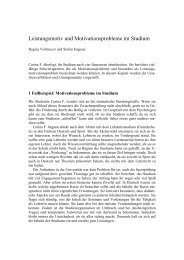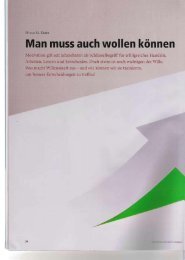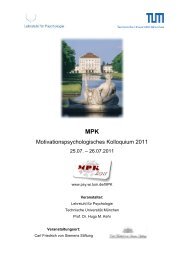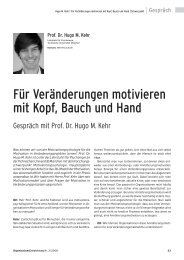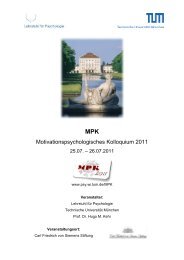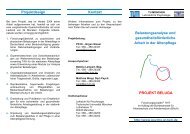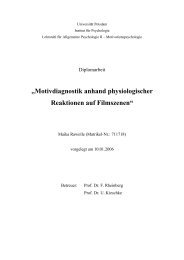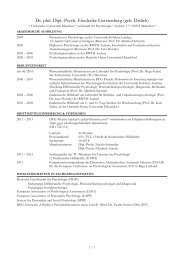Running head: Incentives and flow-experience in learning settings ...
Running head: Incentives and flow-experience in learning settings ...
Running head: Incentives and flow-experience in learning settings ...
- No tags were found...
Create successful ePaper yourself
Turn your PDF publications into a flip-book with our unique Google optimized e-Paper software.
3.1.2. “Local” antecedents of <strong>flow</strong> <strong>experience</strong>In this section we take a “local” perspective on <strong>flow</strong> antecedents byconsider<strong>in</strong>g <strong>in</strong>dividual differences. We will discuss the autotelic personality,motivational competence, self-concept, <strong>and</strong> self-regulation skills.Csikszentmihalyi showed that <strong>in</strong>dividuals generally differ <strong>in</strong> the <strong>in</strong>tensity <strong>and</strong>frequency with which they <strong>experience</strong> <strong>flow</strong> (Csikszentmihalyi & Csikszentmihalyi,1988). Csikszentmihalyi <strong>and</strong> Rathunde (1992) suggested that an autotelic personalitymight expla<strong>in</strong> these <strong>in</strong>dividual differences. “An autotelic person is one who f<strong>in</strong>ds<strong>in</strong>tr<strong>in</strong>sic motivation <strong>and</strong> <strong>flow</strong> <strong>in</strong> everyday life […], who f<strong>in</strong>ds enjoyment <strong>in</strong> activitiesthat would make others bored or anxious” (Csikszentmihalyi & Rathunde, 1992, p.88). A longitud<strong>in</strong>al study with talented teenagers revealed that students who scoredhigh on the personality factors achievement motive, endurance, sentience <strong>and</strong>underst<strong>and</strong><strong>in</strong>g reported more <strong>flow</strong> dur<strong>in</strong>g the week. Csikszentmihalyi <strong>and</strong> Rathunde(1992) suggested that those personality factors are similar to the autotelic qualities ofbe<strong>in</strong>g energetic <strong>and</strong> capable, <strong>and</strong> be<strong>in</strong>g open to new challenges (Csikszentmihalyi &Rathunde, 1992). In order to specify Csikszentmihalyi’s description of an “autotelicpersonality”, Kimiecik <strong>and</strong> Jackson (2002, p. 515) def<strong>in</strong>ed the autotelic person as an<strong>in</strong>dividual who generally does th<strong>in</strong>gs for their own sake, rather than to achieve somelater external goals (Kimiecik & Jackson, 2002, p. 515). They studied <strong>flow</strong> <strong>experience</strong><strong>in</strong> sportsmen <strong>and</strong> sportswomen <strong>and</strong> suggested that dispositional factors constitute anautotelic personality. They suggested that task orientation (rather than egoorientation), high perceived ability, low trait anxiety, <strong>and</strong> high <strong>in</strong>tr<strong>in</strong>sic motivation(operationalized by a high need for autonomy accord<strong>in</strong>g to Deci & Ryan, 1985) arerelated to <strong>flow</strong> <strong>experience</strong> (Jackson, Kimiecik, Ford, & Marsh, 1998). However, theauthors critically mentioned that their “[…] f<strong>in</strong>d<strong>in</strong>gs lend credence to the notion thatsometh<strong>in</strong>g ak<strong>in</strong> to autotelic personality may exist“ (p. 517), but that “we have a longway to go, however, <strong>in</strong> figur<strong>in</strong>g out the role of personality factors <strong>in</strong> underst<strong>and</strong><strong>in</strong>goptimal <strong>experience</strong> <strong>in</strong> sport” (p. 517).Another personal feature that can expla<strong>in</strong> <strong>in</strong>dividual differences <strong>in</strong> <strong>flow</strong><strong>experience</strong> is “motivational competence” (Rhe<strong>in</strong>berg, 2008). It is def<strong>in</strong>ed as theability to reconcile current <strong>and</strong> future situations with activity preferences enabl<strong>in</strong>g the<strong>in</strong>dividual to function efficiently, without the need for permanent volitional control”(Rhe<strong>in</strong>berg, 2002). The most important component of motivational competence is anaccurate sense of one’s own implicit motives (Rhe<strong>in</strong>berg, 2008). Know<strong>in</strong>g one’simplicit motives enables to br<strong>in</strong>g one’s motivational self-concept (or explicit motive,see McClell<strong>and</strong>, Koestner, & We<strong>in</strong>berger, 1989) <strong>in</strong>to agreement with the implicitmotives. This facilitates the sett<strong>in</strong>g of goals that fit to both motive systems. Goalstriv<strong>in</strong>gwhich is based on motive congruence guarantees the absence of volitionalcontrol <strong>and</strong> the presence of activity-related <strong>in</strong>centives, which are both beneficial forthe <strong>experience</strong> of <strong>flow</strong>. In contrast, if the implicit <strong>and</strong> explicit motive systems are<strong>in</strong>congruent, <strong>in</strong>dividuals are likely to set goals that do not fit their implicit motives<strong>and</strong> thus h<strong>in</strong>der <strong>flow</strong> dur<strong>in</strong>g goal-striv<strong>in</strong>g. Empirical support for the <strong>flow</strong> hypothesisof motivational competence (see Rhe<strong>in</strong>berg, 2008) was provided by Clavadetscher(2003) who was <strong>in</strong>terested <strong>in</strong> the <strong>flow</strong> <strong>experience</strong> of voluntary workers <strong>and</strong> found that<strong>in</strong>dividuals with congruent implicit <strong>and</strong> self-reported motives reported a higheramount of <strong>flow</strong> <strong>experience</strong> than <strong>in</strong>dividuals with <strong>in</strong>congruent motives. Engeser et al.(2005) showed that students of a statistics course whose implicit achievement motivewas high <strong>and</strong> congruent with a high self-attributed achievement motive could betterself-regulate their behavior. They could better identify themselves with their actions11



